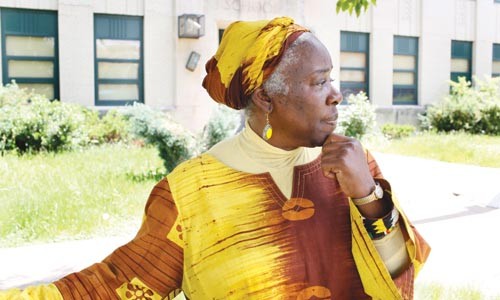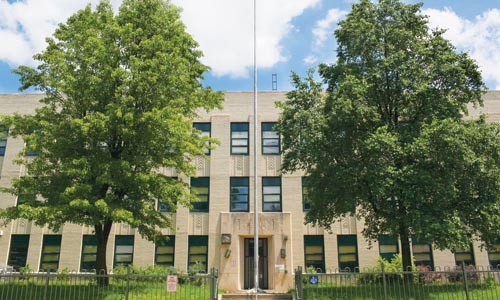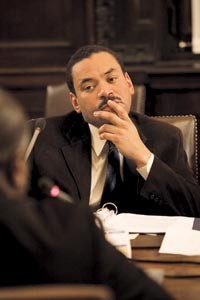When you watch the video, it's hard to see why anyone would oppose bringing Imagine Schools into their district. The students on film look so happy.
"We are ... Imagine!" they shout in unison from their classrooms.

Watching the video on April 7 were two dozen Hazelwood residents, gathered in the pews at the Keystone Church. From the video they learned about Imagine, a "not-for-profit" organization that values "integrity, justice and fun" while turning "bad apples" into good students.
Imagine, they were told, wanted to open a new K-8 "charter school" -- an independent, publicly funded alternative to public schools -- nearby. The "Community Service and Leadership Development Charter School" would be housed in Burgwin Elementary, which Pittsburgh Public Schools shuttered in 2006.
"We chose to come to Hazelwood because we thought it would help the community," said Sam Howard, Imagine's executive vice president, after the 30-minute video ended. "We're in the school business."
But while Imagine boasts of some successes -- an environmental school in Regent Square arguably among them -- it has a controversial reputation. And whatever impression its video might give, Imagine is not a nonprofit. (It applied for nonprofit status five years ago, and "The IRS takes forever to do anything," Howard tells City Paper.) It's a Virginia-based company that can play hardball, pressuring Pittsburgh's school board with full-page ads in the daily paper, and hiring a former board member as a local advocate.
But Imagine already receives roughly $1 million in tax money each year to operate the Regent Square school. And school administrators, who want to hold onto that revenue themselves, don't want to see it get any more.
"A lot of my friends in education around the country are very supportive of the charter movement," says Pittsburgh Schools Superintendent Mark Roosevelt. "But I have not had a single person once say to me, 'Wow! Imagine Schools.' It's always been, 'Watch out for Imagine Schools.'"
Charter schools are a sort of hybrid between public and private schools. While operated independently, they are financed with public dollars. And while they have broad leeway in areas like setting curriculum, they are held to the same academic and legal standards as public schools. They are open to any student in a district. (Students are enrolled by lottery if demand is high.)
For Sarah Jameela Martin, charters offered a chance to fill a void left by the school district she once served.
A teacher and administrator for the Pittsburgh Public Schools for 43 years, Martin says she decided to create the Community Service school two years ago. Upset with the lagging academic performance of black children -- "people overlook them," she says -- she hoped to open a school that taught students how to become community leaders. To that end, students would be separated into all-male and all-female classrooms.
"The need to lessen distractions really germinated this idea," says Martin, of Knoxville.
To launch the program, she and a group of other local educators reached out to Imagine Schools.
Established in 2004, Imagine is the nation's largest charter-management company, holding contracts at 71 schools nationwide. It's run by Dennis Bakke, the former CEO of energy company AES, and his wife.
Starting a charter school isn't easy. A founding group must garner local support, write a curriculum, and buy or lease a building. Imagine, though, could write the lengthy application and help the Hazelwood group craft a curriculum to meet state standards. It could even help secure the Burgwin building: Samuel Glasser, a St. Louis real-estate developer who often does business with Imagine, offered to buy it last September for $350,000.
Imagine also had a local track record. Since 2005, when Roosevelt took the superintendant's job, the Pittsburgh school board had rejected five out of six charter applicants. The lone exception was the Environmental Charter at Frick Park -- an Imagine school opened in 2008.
But when Martin's group came forward with its proposal, the district rejected it, twice. In a February 2009 decision, district officials cited a number of concerns, including a failure to "detail how the charter school will offer expanded choice."
"The Environmental school was offering something [the district] was not," says school-board member Theresa Colaizzi. "The one in Hazelwood is not offering something so spectacular." Charters have to offer programs students can't get elsewhere, and Colaizzi says the district already offers training in community leadership. Perry High School, for example, includes community service in its curriculum.
Martin and Imagine have gone to a state appeals board, which will either reverse or uphold the board's rejection sometime this summer. But the school board has made its intentions clear.
E-mail correspondence shows that Glasser's initial $350,000 offer for the building was never considered. Sales of school buildings are handled by the city's Urban Redevelopment Authority, but in a November 2009 e-mail, URA real-estate director Kyra Straussman told Glasser that district policy prohibits considering "charter-school proposals for the reuse of closed Pittsburgh public schools."
The board scrapped that policy in January, after it was criticized by charter-school advocates. But by the time Glasser submitted another proposal -- this one for $200,000 -- the district had lined up another buyer.
The district reached an agreement to sell the building to church group Oasis Ministries, for just $15,000. But shortly before the board cast a final vote on the transaction in March, the URA raised concerns about Oasis' financial stability.
That took the Oasis bid off the table. Pittsburgh Schools' solicitor Ira Weiss says there are currently no offers for the Burgwin building.
Even now, Roosevelt says it wouldn't make much sense to sell a building to a school that's unlikely to open: "It would be quite disingenuous to sell [the building] to Imagine's pals when you have no intention on granting the charter."
To Martin, the district's actions "show their determination to deny additional school choice." But Imagine has shown plenty of determination on its own.
On March 23, the day before the district was supposed to sell the building to Oasis, Imagine took out a full-page ad in the Pittsburgh Post-Gazette. The district's moves "could cost you, as taxpayers, hundreds of thousands of dollars," the ad stated, while seeking "to deny parents the school choice that they desire."
"Why not call and ask them why?" it concluded, including contact information for Roosevelt and Colaizzi.
The ad wasn't Imagine's only form of outreach. The company has hired a former school-board member, Randall Taylor, as a consultant and advocate.
Taylor served on the city's school board for 12 years -- much of which he spent as "an out-and-out opponent" of charter schools. (Imagine has hired other locals with school district ties as well: Former district administrator Phil Parr, for example, helped the company launch the Environmental School.)
But Taylor says he's not singing a different tune just because Imagine is paying the piper: "I'm not for sale," he assures. Instead, he says, he came to the realization that on its own, the district wasn't doing enough for students.
"It's critical that the school-choice movement grows in this city," he says. "There has to be some kind of option."
Taylor suspects that the district is fighting the Hazelwood charter because the school's success would spawn more programs.
"It's a guarantee," says Taylor. "That is what's going to happen."
Roosevelt, a one-time Massachusetts state legislator who wrote that state's charter-school law, counters he's not opposed to charters per se: "I'm anti-bad charter."
Research suggests that in terms of performance, charter schools are a mixed bag -- much like public schools. According to a 2009 Stanford University study of test scores, "Nearly half of the charter schools nationwide have results that are no different from the local public-school options." In fact, more than one-third of charters "deliver learning results that are significantly worse than their students would have realized had they remained in traditional public schools."
But other studies present a more optimistic picture. And in Pittsburgh, charters are holding their own.
According to a 2009 analysis, students in all but one city charter school scored roughly the same or better on state reading and math tests as students in the public system.
"Some of our charter schools are doing quite well in general, and they're doing quite well for black kids," says Carey Harris, executive director of education advocacy group A+ Schools, which published the report. "We have schools in Pittsburgh with similar demographics that aren't doing as well."
While acknowledging the success of some city charters, Roosevelt argues that they shouldn't be compared to the district as a whole. Instead, he says, they should be compared to city "magnet schools," where families sign up for special programs. Students in magnet and charter schools alike, he notes, have parents who "have actually done something that shows they're advocates for their children." Such interest at home is "hugely important" in helping kids succeed.
And public magnet schools do compete well with charters. For instance, 2009 scores in reading and math for third-graders at Dilworth, an East Liberty magnet, were slightly better than those at the Urban League Charter School.
But by the same token, charter advocates say, the numbers show that charters are viable options.
"Pittsburgh has done a tremendous job with their charter schools," says Larry Jones, president of the Pennsylvania Coalition of Public Charter Schools. So, he wonders, "[W]hy aren't there more?"
In Pennsylvania, school districts are responsible for authorizing and monitoring charter programs ... even though accepting charters can complicate a district's financial picture. For every student a charter takes, the district loses roughly $12,000 in government funding. According to 2010 budget projections, Pittsburgh schools will lose roughly $36 million, 7 percent of its total budget, to charters.
"I don't like to see our money go," admits school-board member Jean Fink.
And there's reason to keep an eye on it. Philadelphia's school district has 67 charter programs. Eighteen charters in the city are part of a federal criminal investigation, according to the Philadelphia Inquirer. Thirteen of those, according to a recent report by the city controller, suffer from serious fiscal mismanagement.
Pittsburgh's charters have avoided such problems; Roosevelt credits that to the careful review process. He says he's especially cautious of so-called "mom-and-pop" charters -- which may struggle to compile a solid curriculum, or to handle administrative tasks -- as well as charters that may be too sophisticated.
"You have to be very careful about people who are perhaps in the business for not the right reasons," he says. "I think Imagine begins to look like that."
Visiting the Environmental Charter School at Frick Park, it may be hard to understand that distrust. Housed in the former Regent Square Elementary building, the school opened in the fall of 2008. It currently offers grades K-4, with plans to expand, by one grade a year, to eighth grade.
As the name suggests, the school's curriculum is programmed through an environmental lens, using nearby Frick Park as a laboratory.
"It really is engaging for students to achieve math outcomes by measuring the circumference of indigenous oak trees in the park," says Principal Jon McCann. "It's better than crusty teachers standing there and saying, 'OK, we're gonna look at page 22 of the math book today.'"
Administrators say the school must be doing something right: It already has a waiting list of a few hundred students.
Parents seem pleased with the program. Stephanie Land, the parent of two students enrolled there, says "They're learning a lot about nature."
"They've made learning real for the kids," agrees Mark Zang, whose fourth-grade daughter attends the school. "This is a great school."
According to 2009 state test scores, in fact, nearly 83 percent of the school's third-graders scored "Proficient" or "Advanced" in reading; 81 percent scored the same in math. That's 20 percentage points higher than the district average in reading and 10 percentage points higher in math.
Even Roosevelt acknowledges the school's strengths: "good principal, good teachers." But he hesitates to heap too much praise on it. For one thing, test scores may have more to do with the students it attracts than with how it teaches them.
Only one-third of the charter's students are eligible for free or reduced lunches -- a designation that indicates poverty status. In Pittsburgh's public elementary schools, by contrast, 71 percent of students are eligible for the lunch programs.
Also, while nearly half of Pittsburgh's elementary kids are black, less than 30 percent of Imagine students are.
"The population ... is distinctly non-diverse," Roosevelt says. "That bothers me."
And not every Imagine school has been so successful. Ohio, for example, has 11 schools run by Imagine, but recently barred the company from opening any more, largely because of poor academic performance.
Rather than rely on federal "No Child Left Behind" proficiency rankings, Imagine tracks its success internally, testing students before and after an academic year to see how they improve. "Our schools performed very well academically" in 2007-2008, Imagine's website (www.imagineschools.com) states. In one year of teaching, "The mean learning gain for all Imagine students ... was close to 1.5 years."
Meanwhile, there have been questions about how the company uses public dollars, and how independent its local boards are.
By state law, charter schools must be run by nonprofit groups. Those nonprofits can, however, team up with for-profit companies to help operate the school. Imagine, it seems, is an assertive partner: "Imagine Schools operates the entire school and is not a consultant or management company," the company explains on its website. And in a 2008 internal e-mail uncovered by the St. Louis Post Dispatch, CEO Bakke didn't sound like a guy very interested in deferring to local control.
Local board members "didn't finance the start up of the school or the building," Bakke wrote to Imagine execs. "I do not mind them being grateful to us for starting the school (our school, not theirs)," he added, writing that principals should seek the board's "advice" on decisions. But he urged that the boards should not feel "they are responsible for making big decisions" on issues like "budget matters, school policies, [or] hiring of the principal."
Imagine executive Sam Howard says the CEO's e-mail was merely his "opinion."
"His opinion and the way the schools operate are two different things," he says. After all, he says, local board members "are the boss. How can you tell your boss what to do?"
Still, in April, The New York Times reported that in some states, regulators have accused Imagine of "elbow[ing] the charter holders out of virtually all school decision-making," including hiring and firing.
Imagine issued a statement, claiming the Times article "misled its readers." Without directly addressing many of the story's charges, Imagine's letter says the Times "ignored every positive Imagine news story" and "didn't interview ... satisfied parents and educators."
Locally, the board of the Environmental Charter School signed a contract with Imagine in October 2007. That agreement dictates that the budget be drafted by the company, with approval by the board. It also requires that the school pay Imagine 12 percent of its revenues each year -- an amount that totaled $406,000 in 2009, according to an independent financial audit. Howard says the 12 percent fee is Imagine's "cost of doing business," noting that it pays for services like professional development and recordkeeping. "Everything a school district would be doing, we're doing," he says.
The school must also pay off a $250,000 loan that Imagine took out to launch the program. The loan -- which will cost the school $2,500 per month over 20 years -- has an interest rate of 10.524 percent.
And then there are the rent payments.
The Environmental School's building was purchased in 2006 by Schoolhouse Finance for $3 million. Schoolhouse is Imagine's real-estate arm; while the two are separate business entities, they have the same mailing address and the same officers. Some worry about a conflict of interest if Imagine is, essentially, partnering with its own tenants.
"If Imagine controls both sides of the transaction," says Marc Dean Millot, editor of the online education report K-12 Leads, "who is going to get the benefit of the bargain?"
The Environmental School's lease, which is binding until 2032 unless the school charter is terminated, costs $526,000 per year. School district solicitor Ira Weiss calls that amount "breathtaking. These [lease deals] are cash cows for Imagine."
The new Hazelwood school would operate under similar financial terms, paying a 12 percent management fee and shelling out an estimated $3.7 million in its first five years. (It's unclear what rental payments at Burgwin would be.)
"My concerns with the school revolve around the franchise-type arrangement with Imagine Schools," says Barbara Daly Danko, a business manager at the Environmental School from June 2008 to August 2009. She says she left largely because of concerns over those terms. "The contract between the local board and Imagine Schools is complicated, long-term and -- in my opinion -- very expensive."
Not everyone agrees.
Rick Wertheimer, the CEO of City Charter High School, says, that while "you and I don't want our tax dollars going into [a company's] profit," what if the school "outperforms the 12 schools within a five-mile radius? Was it worth the 12 percent?"
Wertheimer's school, meanwhile, pays about $16 per square foot in rent -- slightly more than the $15 per square foot Imagine gets. (By comparison, the Urban League's East Liberty charter pays $14 per square foot; Lawrenceville's Career Connections Charter High School pays just $9.)
In any case, "We have complete control over the money," says Robert Warden, who chairs the Environmental Schools' board.
Warden admits that when he read media accounts of Bakke's e-mail, he was "highly offended." But, he says, "This board is very independent, fiercely so."
"I'm extremely proud of this school and what it's accomplished," Warden adds. "I've had parents say, 'Oh, you're being run by a for-profit.' Well, we're not."
On the other hand, while Warden says Imagine is "more or less" earning its 12 percent fee, he acknowledges that "[l]ike any other vendor, you've got your issues." But he declined to go into detail: "[T]hose are between Imagine and the board," he says.
Are Imagine's supporters in Hazelwood -- some of whom already feel pushed aside by the school district -- setting themselves up to be disappointed again?
"[Imagine] is a large, complex, multi-state company," says David Hansen, vice president of external affairs for the National Association of Charter School Authorizers. "What really is needed to deal with Imagine, or any management company, is a strong, independent board,"
It may be ominous that one of Imagine's chief advocates, Sarah Jameela Martin, says she was unaware of the company's problems elsewhere until informed by CP. After reading critical articles about Imagine, though, she's still confident about the firm.
"From what I gather, Imagine's [Environmental Charter School] is not having any of the problems" other schools have experienced, Martin wrote CP in an e-mail. "I see the proposed [Hazelwood] school functioning equally well."
And community leaders say they're proceeding with both eyes open.
Imagine's problems "are certainly a concern," says Rev. Tim Smith, a pastor at the Keystone Church of Hazelwood. While he wants a school to be opened there someday, he says, "There are questions that still need to be answered."
"If [Imagine] wants to do right, we'll work with them every step of the way," says Lutual Love, coordinator of the Hazelwood Organizational Partnership. "But if they plan to BS us like we're dumb, ignorant residents, they've got a big surprise.
"Maybe we can help bring a good charter school to the community," he adds. "Or maybe we can save our community from some great abuse."




















